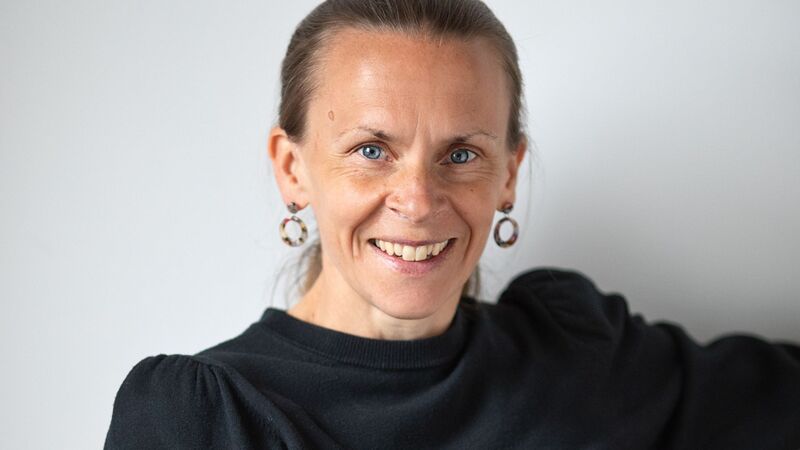You are viewing your 1 free article this month. Login to read more articles.
Children's Laureate Child worries books are 'too cheap'
The perils and opportunities of digital, recent pushes for greater diversity in publishing and the “devaluation” of books were all discussed at The Bookseller's Children’s Conference on Tuesday (26th September).
Children’s Laureate Lauren Child revealed she felt books had become “too cheap” at the conference at London’s Milton Court. The writer and illustrator discussed her concerns over people spending too much time on screens and the livelihoods of authors in her keynote lecture ‘From Charlie and Lola to children’s laureate’.
She said: “Books have become a little devalued, they’ve become too cheap. We ache to sell too many to make money yet it is somebodies’ livelihood. That’s their work. I know novelists that can’t afford to be novelists anymore.
"When I was first writing, I had two other jobs…you ought to be able to support yourself. It’s just becoming too difficult....Books are so cheap, if you think how long it takes to produce, how many people involved - a cappuccino is the same price. Make books more expensive? yes!”
Child urged people to “look up and see things, away from phones” and said that “busy is seen as the right way to be” but that parents need to keep the “connection” to their children through reading with them.
Her sentiments echoed the keynote speech from DK’s chief executive Ian Hudson earlier in the day. Hudson railed against fake news, paid for ads and internet misinformation as he revealed a study of 1,000 adults and their children aged 10-18. The research explored anxieties often associated with digital platforms and said that children’s non-fiction offered much-needed “trust and authority”.
“The internet is a mass repository of information and misinformation and when an internet search can bring up fake news, paid-for-ads or SEO optimised articles rather than high quality content, the need for accessible, curated books is greater than ever," he said.
In the morning, Hachette Children’s Group’s c.e.o Hilary Murray Hill had also offered a note of caution in her keynote speech over children’s “overuse of social media and time online” and asked publishers to “act as agents of social change”.
The opportunities of digital were explored in a session entitled ‘New routes to the customer’, in which Julia White who oversees entertainment and lifestyle content partnerships at Twitter, revealed how to make the most of the platform. She recommended that publishers keep their “tone of voice authentic” on social media and revealed that videos in tweets performed best in terms of engagement and reach.
Fellow panelist bookblogger Lucy Powrie emphasised the importance of paying content creators and said that making videos took time so this should be recognised. She said: “If working with a creator, pay them. Honesty is key - YouTube is all about establishing a personal connection with your audience.”
Phil Henderson, books buying manager at Asda, said he was concerned that the squeezed economy could reflect in Asda customers’ book-buying habits.
He revealed when he volunteered as a reader at a school in Leeds and he was shocked to see a girl “of eight or nine” reading a book which his children had read aged three. He said that when he asked if she had books at home, she told him “I had one but my cousin took it”. Henderson said: “It took everything in me not to say, ‘Right, that’s it, we’re off to Waterstones to buy your books’.”
“We have that problem out there - we have a huge proportion of our population who don’t even consider buying books."
Approaches to boosting diversity in publishing were discussed in various sessions including ‘Publishing with a passion’ led by Dr Alice Curry, founder and publisher of Lantana, a venture which aims to reflect the “multicultural world".
Author and illustrator Nadine Kaadan, who is published by Lantana, revealed that often cultural diversity was handled “insensitively” in the UK books industry with an “exaggerated focus on cultural differences…often depicting the camel in the desert”. Curry said the company, which was founded in 2014, had not always enjoyed “an easy ride” but called on publishers to be open to representing other voices and countries and “be brave even if your passion seems to go against trends”.
Lauren Ace, brand director at Little Tiger Group, similarly urged the industry to embrace diversity and publish more BAME authors in the case study session ‘A Change is Gonna Come’ which focused on the anthology of the same name, recently published by Little Tiger's imprint Stripes. Ace said: “People are worried about getting it wrong, and this fear is holding people back, [I think we all need to] put those fears aside and get on with it.
“Use your privilege - within the structures of society white privilege is so ingrained and that translates into this industry as well. We all should acknowledge this, but recognise that you have a say in how your business is run, so open doors, provide opportunities and collaborate with people of colour.”
The Bookseller's charts and data analyst Kiera O'Brien also revealed at the conference that 37 million children’s books have been sold for £218m for the year to date, a 1.79% drop in both volume and value against the same period in 2016 - although without Harry Potter and the Cursed Child (Little, Brown) the market is actually up 3.85% for the year-to-date.
















